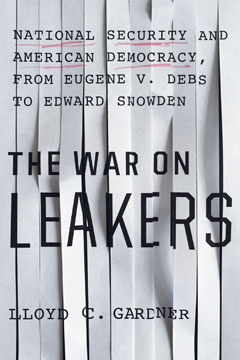The War on Leakers
A bold new history of the motivations and role of national security leakers—the essential backstory to understanding the Snowden case, NSA eavesdropping, and the future of privacy
“Always at the heart of the matter was the Obama administration’s decision to invoke the 1917 Espionage Act. Indeed, that act had become the central issue in the government’s efforts to shut down leaks of classified information. . . . The flip side of the Great War on Terror had become a War on Leakers.” —from The War on Leakers
Four days before Pearl Harbor, in December 1941, someone leaked American contingency war plans to the Chicago Tribune. The small splash the story made was overwhelmed by the shock waves caused by the Japanese attack on the Pacific fleet anchored in Hawaii—but the ripples never subsided, growing quietly but steadily across the Cold War, Vietnam, the fall of Communism, and into the present.
Torn from today’s headlines, Lloyd C. Gardner’s latest book takes a deep dive into the previously unexamined history of national security leakers. The War on Leakers joins the growing debate over surveillance and the national security state, bringing to bear the unique perspective of one our most respected diplomatic historians. Gardner examines how our government and our media have grappled with national security leaks over nearly five decades (in often sharply contrasting ways); what the relationship of “leaking” has been to the exercise of American power, during and after the Cold War; similarities and differences between leakers over time; and the implications of all this for how we should think about the role of leakers in a democracy.
Gardner’s eye-opening new history offers a sharp reframing of our raging debates—asking us to consider why America has invested so much of its resources, technology, and credibility in a system that all but cries out for loyal Americans to leak its secrets.










